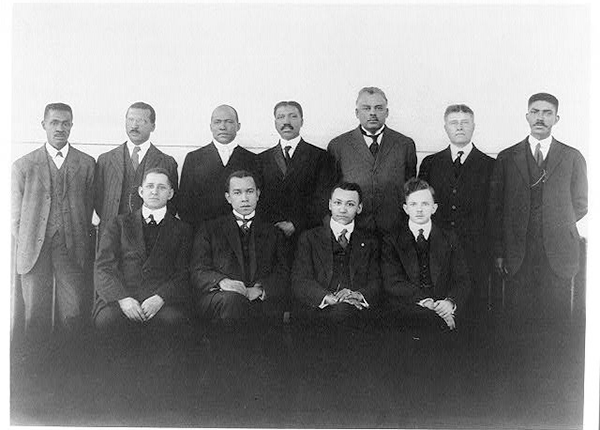Historic Document
Platform Adopted by National Negro Committee (1909)
NAACP | 1909

Library of Congress, Prints and Photographs Division
Summary
In 1905, W.E.B. DuBois, John Hope, William Monroe Trotter, and others met in Niagara Falls, Canada, to form the Niagara Movement. There, they committed themselves to DuBois’s call for immediate action and activism to realize the Constitution’s guarantees in the Thirteenth, Fourteenth, and Fifteenth Amendments and elsewhere for equal rights and full civic membership and inclusion without regard to race, in opposition to Booker T. Washington’s more passive accommodationism of Jim Crow segregation and black disenfranchisement. While the movement had lost momentum by 1908, a racist pogrom in Springfield, Illinois, led the group’s members, on the initiative of DuBois, to join pro-civil rights white progressives like Oswald Garrison Villard, William English Walling, and Mary White Ovington, and black activists including Mary Church Terrell and Ida B. Wells-Barnett, to found the interracial National Association for the Advancement of Colored People (1909). The NAACP, with DuBois as its preeminent public voice, as editor and writer for its house organ The Crisis, prominently championed, and spearheaded social and political action, for the immediate recognition of full constitutional rights.
Selected by

William E. Forbath
Lloyd M. Bentsen Chair in Law, and Associate Dean for Research, The University of Texas at Austin School of Law

Ken I. Kersch
Professor of Political Science, at Boston College
Document Excerpt
We denounce the ever-growing oppression of our 10,000,000 colored fellow citizens as the greatest menace that threatens the country. Often plundered of their just share of the public funds, robbed of nearly all part in the government, segregated by common carriers, some murdered with impunity, and all treated with open contempt by officials, they are held in some States in practical slavery to the white community. The systematic persecution of law-abiding citizens and their disfranchisement on account of their race alone is a crime that will ultimately drag down to an infamous end any nation that allows it to be practiced, and it bears most heavily on those poor white farmers and laborers whose economic position is most similar to that of the persecuted race….
We agree fully with the prevailing opinion that the transformation of the unskilled colored laborers in industry and agriculture into skilled workers is of vital importance to that race and to the nation, but we demand for the Negroes, as for all others, a free and complete education ….
[T]he public schools assigned to the Negro of whatever kind or grade will never receive a fair and equal treatment until he is given equal treatment in the Legislature and before the law. Nor will the practically educated Negro … be given a fair return for his labor or encouraged to put forth his best efforts or given the chance to develop that efficiency that comes only outside the school until he is respected in his legal rights as a man and a citizen.
We regard with grave concern the attempt manifest South and North to deny black men the right to work and to enforce this demand by violence and bloodshed….
As first and immediate steps toward remedying these national wrongs, so full of peril for the whites as well as the blacks of all sections, we demand of Congress and the Executive:
(1) That the Constitution be strictly enforced and the civil rights guaranteed under the Fourteenth Amendment be secured impartially to all.
(2) That there be equal educational opportunities for all and in all the States, and that public school expenditure be the same for the Negro and white child.
(3) That in accordance with the Fifteenth Amendment the right of the Negro to the ballot on the same terms as other citizens be recognized in every part of the country.




